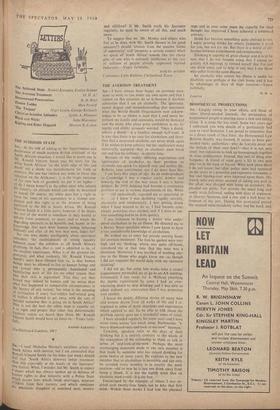THE AVERSION TREATMENT
Sin,--1 have always been happy on previous occa- sions to write to you under my own name and that I cannot on this occasion do so is because it involves admission that I am an alcoholic. The ignorance, moral disgust and misunderstanding that surrounds what the World Health Organisation now acknow- ledges to be an illness is such that I, and more im- portant my family and associates, would be damaged and the many who place great confidence in my in- tegrity and ability seriously worried. 'Once a drunk, always a drunk'—is a familiar enough half-truth. It
. is true that there is no cure for alcoholism and there- fore that a recovered alcoholic can never drink again if he wishes to keep sobriety but the implication more universally accepted—that an alcoholic must break out and lose his sobriety—is utterly false.
Because of the widely • differing experiences and approaches of alcoholics to their problem an alcoholic can speak for himself only and neither Mr. Roberts, your contributor, nor 1 do more than this.
I am forty-five years of age. As an undergraduate at Cambridge I was a regular social drinker and towards the end of the war years I was a heavy drinker. By 1954 drinking had become a continuing problem to me in various departments of life. While so - still undoubtedly regarded me as successful in .:Id I knew I was declining rapidly morally, physically and intellectually. I was getting drunk when I least wanted to do so. I had become com- pletely powerless over alcohol, and if I were to sur- vive something had to be done quickly.
I was fortunate in having a doctor who under- stood alcoholism to be an illness. He directed me to a Harley Street specialist whom I now know to have a very considerable knowledge of alcoholism.
He wished me to enter his private nursing home for aversion treatment. The fees he quoted were very high and my thinking, which was quite off-beam, convinced me at that time that the man was a charlatan. Moreover I was terrified of meeting any- one in the Home who might know me—as though did not acquaint the world daily with my excessive drinking!
I did not go. but some few weeks later a casual acquaintance persuaded me to go to an AA meeting. Fortunately I was ready for it. Without plumbing the depths experienced by sonic I had an over- whelming desire to stop drinking and I was able to admit without any reservation that 1 was powerless over alcohol.
I heard the widely differing stories of many men and women drawn from all walks of life and I re- cognised in some of them situations and experiences which applied to me'. To he able to talk about the problem openly gave me a wonderful sense of relief.
I have attended regularly for some years and 1 have never come across 'too much smug, Buchmanite, "I- was-a-drunkard-once-and-look-at-me-now" business.'
Certainly, speakers refer to the days of their drinking but it is entirely contrary to the whole of the conception of the fellowship to think or talk in terms of 'and-look-at-me-now.' Perhaps the most encouraging statement made to any new member is that Made by someone who has ceased drinking for some twelve or more years. He explains to the new member that as alcoholism is incurable and can only be arrested every member is in exactly the same position—old or new he is just one drink away from being a drunk. It is not the eighth drink that an alcoholic must avoid—it is the first.
Encouraged by the example of others I was en- abled each twenty-four hours not to take that first drink. Within three weeks I had lost the physical urge and as over some years my capacity for clear thought has improved I have achieved a contented sobriety.
Drink has become something quite abstract to me. I enjoy pouring drinks for others. Guinness is good for you, but not for me. But there is a world of dif- ference between contentment and complacency.
Thinking is capable of great change and it is to be sure that I do not become smug that I attend re- gularly AA meetings to remind myself that I'm just one drink away and to help in any way 1 can those who suffer from the same disease.
An alcoholic who arrests his illness is under no disability save perhaps at the club house and it has its advantages in days of high taxation.—Yours faithfully, London
0. D. A.






































 Previous page
Previous page